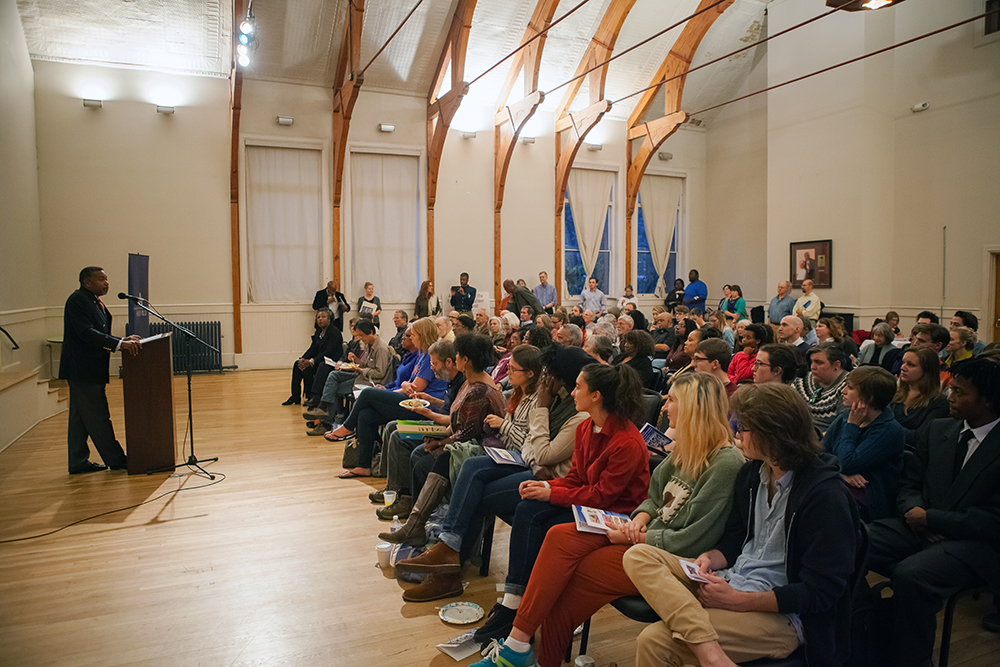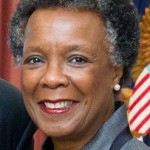The youths of color in Tamiko Ambrose Murray’s Word on the Street program epitomize the power of story. As Murray explains, the students played a critical role in securing approval for $500,000 in Isaac Coleman Community Innovation Investment Grants from the Buncombe County Board of Commissioners in February.
“Before the commissioners had their vote, the Word on the Street squad showed a short documentary that added a story to the data that were being presented,” says Murray. “They had gone into the community and talked with people about their visions, hopes and struggles — they created a model for how story can lead to change.”
Murray and her students will present their success at the African-Americans in WNC and Southern Appalachia Conference, which returns to Asheville for its fourth year Thursday, Oct. 19, through Saturday, Oct. 21. Originally organized by Darin Waters, assistant professor of history at UNC Asheville, to highlight research on the historical African-American presence in the region, the conference is broadening its scope this year with the theme, “Yesterday, Today and Tomorrow.”
Waters describes the role of history in the current African-American experience as twofold. On a practical level, knowledge of the past allows activists and policymakers to craft better solutions for pressing issues in the community. “History is ever-present,” says Waters. “It helps to provide context and grounds our understanding of present conditions.”
Just as importantly, Waters adds, history encourages community leaders to undertake their efforts in the first place. “Telling these stories completely undoes the myth of no African-American presence here, and that lets people feel a sense of place,” he says. “It gives those who are native of the region now a sense of the hard work their forebearers did before they came along.”
The conference opens Oct. 19 at 6:30 p.m. at the YMI Cultural Center with an address from one of those who came before: Judge Yvonne Evans. Evans, a Hendersonville native who attended Asheville’s private, all-black Allen High School, serves as a Superior Court judge in Charlotte. “She has deep roots and connections here in Western North Carolina, so she’ll be able to speak about what that experience was like during the time she was growing up,” says Waters.
On Oct. 20 and 21, the conference moves to UNCA’s Wilma M. Sherrill Center for presentations and panel discussions beginning at 9 a.m. In addition to featuring historical research, such as a study of gentrification in Asheville’s East End community, the event will showcase academics and activists focused on the present. One major contribution will be work from UNCA’s State of Black Asheville classes, organized by Dwight Mullen, professor of political science.
The event closes Saturday evening at The Collider in downtown Asheville, where the giving circle CoThinkk will present awards with the “tomorrow” of the conference’s theme in mind. The ceremony, titled “Becoming We: Strengthening Through Our Roots,” will recognize eight leaders from communities of color and their allies, as well as announce grant funding for grassroots organizations throughout Western North Carolina.
Tracey Greene-Washington, founder of CoThinkk, explains that her partnership with the conference aims to increase visibility for the region’s communities of color. “When people talk about Asheville’s 2020 plan of being a diverse, engaged community, it includes these folks that aren’t at the table,” she says. “If they are visible, it’s from a vantage point of someone doing something for them, as opposed to the reality that they’re leading some of the most creative and innovative work.”
History, says Greene-Washington, can provide an antidote to institutional barriers that often discourage work by communities of color. “Because people of color comprise such a small portion of the population but show up disproportionately when overlaying issues of poverty and health, that creates a false narrative about their abilities and the possibility of them being a part of the solution,” she says. Celebrating the contributions of past leaders offers an alternative story, one that instead inspires new activists for progress.
Murray, whose Word on the Street students will give the keynote speech at the CoThinkk awards, agrees that accurately relating the community’s history is critical to its future. “Transformation, healing and coming together to make the changes we want to see starts with telling our stories,” she says. “It’s important that we are able to tell our own stories so they’re not told for us.”
WHAT: Fourth annual African Americans in WNC and Southern Appalachia Conference
WHERE: YMI Cultural Center, Sherrill Center at UNC Asheville and The Collider
WHEN: Thursday, Oct. 19, to Saturday, Oct. 21
DETAILS: aawnc.unca.edu







Before you comment
The comments section is here to provide a platform for civil dialogue on the issues we face together as a local community. Xpress is committed to offering this platform for all voices, but when the tone of the discussion gets nasty or strays off topic, we believe many people choose not to participate. Xpress editors are determined to moderate comments to ensure a constructive interchange is maintained. All comments judged not to be in keeping with the spirit of civil discourse will be removed and repeat violators will be banned. See here for our terms of service. Thank you for being part of this effort to promote respectful discussion.